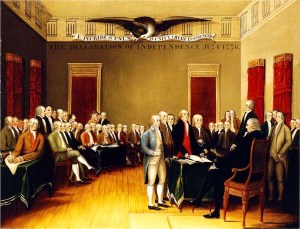We support our Publishers and Content Creators. You can view this story on their website by CLICKING HERE.
Unlike our present politicians, George Washington and Russell Kirk cared about the common good, strove for it, and constantly reminded us what it means to be a citizen of a republic.
Dear Imaginative Conservative reader, as we approach this journal’s fourteenth birthday, I owe a humble apology (bless me, Father, for I have sinned!) to all of you. I’ve not contributed anything to TIC for nearly a year. Maybe you’ve not noticed, and maybe you have.
Please know that my absence had nothing to do with the quality of TIC or the excellent editorship of Winston Elliott III. Rather, I simply burned out on writing. And, it’s incredibly strange for me to admit this even to myself, as so much of my self-understanding and self-definition is wrapped up in my writing, output, and productivity.
Since about age 6 or 7, I’ve wanted to be a professional writer. Back then, I made up all kinds of adventures, especially fantasy adventures about a Paladin knight by the name of Cirion. Or, I tried to write poetry (it was terrible! My fantasy stories were better, crazily enough).
This brings me back to The Imaginative Conservative. Between its founding in 2010 and the year 2023, I wrote a weekly essay. Indeed, for several years, I actually wrote two essays a week. In other words, I’ve written close to 830 essays for TIC. And, I’ve loved every moment of it, even, as I noted above, defining myself by my output. But, I also, unfortunately, got really burned out. Again, this burn out had nothing to do with my love (or lack there of) for TIC or Winston. It just happened.
So, for the last year, I’ve written quite a bit on other projects—a book on Tolkien and the Inklings, an intellectual biography of Robert Nisbet, and one on Ray Bradbury and the Moral Imagination. I’m also writing a 250th anniversary history of the Declaration of Independence. However, this means that I’ve let my TIC contributions slide to nothing, and, for that, again, I am profoundly sorry.
For what it’s worth, though, I think I’m ready to resume a regular schedule of writing. Here’s hoping the year off gave me a fresh perspective on things.
Yet, as I write this—looking over the past year—the world is in nearly complete chaos. Constitutionally, we’re in a mess. The Supreme Court, for example, backs Texas troops on the Mexican border, while the executive branch backs federal troops. Amazingly, there’s not been much a clash between the two. Additionally, the president—in complete violation of Articles I and II of the U.S. Constitution—forgives billions of dollars of student loans. Even the Supreme Court has tried to stop the president, but to no avail.
We have an election coming up—one that certainly repeats huge aspects of the 2020 election. Former president Trump is now a convicted felon. That’s new in American history!
We’re 34 trillion dollars in debt. That’s new, too! Remember, our last balanced budget was under, of all presidents, Bill Clinton.
Abroad, despite little national conversation regarding such things, we’re deeply entangled with Ukraine, Israel, and Taiwan, pitting us, however, indirectly against Russia, Iran, and China, respectively. Though the public and the press say almost nothing about this, we’ve also fighting rather seriously in Niger, though President Biden has relatively recently called for a troop pull-out.
Though the power to declare war resides constitutionally within it, Congress seems worse than impotent.
Conservatives had also deeply divided since 2016, with all kinds of adjectives being added to the august term.
And, yet, and yet, and yet… I would argue that all that was true remains true, no matter how many labels we might give a thing. In his farewell address, President George Washington, arguably our greatest president, gave voice to several worries. First, he warned us against excessive debt. Second, he warned us about the divisive nature of political parties, and, third, he warned us again entangling alliances with foreign powers. The warnings seems as important in 2024 as they did in 1797. Our ancestors speak to us, but do we listen?
I’m also reminded that the founder of post-World War II conservatism, Russell Kirk, never needed to modify the word conservative. He was not a neo-con, a theo-con, or a NatCon. He was, simply, a conservative. He defined his conservatism over the years through four tenets or canons, five canons, six canons, and, at the end, in ten. I’ll stick with the mainstream six from his magisterial 1953 book, The Conservative Mind.
First, a person must believe in something higher than himself. When Kirk first wrote this, he, not yet a Christian, was probably thinking of something like the Stoic Logos, something that unifies all of us, rendering us equal before the eyes of the Divine.
Second, a person must believe in the dignity of the human person, embracing what Kirk called the principle of proliferating variety. Each person, therefore, is a unique reflection of the Divine, born in a certain time and in a certain place, never to be repeated.
Third, the best way to express our uniqueness—honing our gifts as well as delimiting our foibles—is through community. Here, Kirk sounds very much like Aristotle, recognizing that man is meant to live in a Polis. Community allows us to become what we are meant—by God or nature—to become.
Fourth, that of all our natural rights, the most important for us is the right to property. Through this right, we make ourselves morally, physically, and spiritual culpable. If we lose the ability to own ourselves, we give everything over to Leviathan.
Fifth, a recognition that the great human laboratory is the past as a whole. There, in the past, we see all the excellences as well as the follies of humanity. As Kirk wrote, “custom, convention, and old prescription are checks upon man’s anarchic impulse and upon the innovator’s lust for power.”
And, finally, six, an understanding that reform—taking that which is given to us and judging it—is a critical part of life. Indeed, through prudence, each generation must decide what to inherit, what to change, and what to discard. But, “hasty innovation may be a devouring conflagration.”
Frankly, I’ll take the voices of Washington and Kirk any day over those of Biden, Trump, and their ilk. Unlike our present politicians, Washington and Kirk cared about the common good, strove for it, and constantly reminded us what it means to be a citizen of a republic.
It’s good to be back…
The Imaginative Conservative applies the principle of appreciation to the discussion of culture and politics—we approach dialogue with magnanimity rather than with mere civility. Will you help us remain a refreshing oasis in the increasingly contentious arena of modern discourse? Please consider donating now.
The featured image is Portrait of George Washington Taking the Salute at Trenton (1856) by John Faed, and is in the public domain, courtesy of Wikimedia Commons.

 Conservative
Conservative  Search
Search Trending
Trending Current News
Current News 






